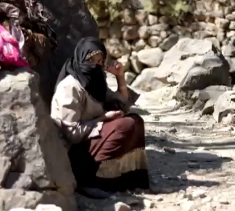
SAN'A, Yemen (Jan. 26) – The international community had better work fast. The portion of this week's conference in London meant to address Yemen's multitude of problems is scheduled to last only two hours.
For this Yemen power-session, tacked on Wednesday to a full-day conference on Afghanistan the next day, the assembled government officials and nongovernmental experts have a goal that is simple to state but hard to implement: They want to keep Yemen, often dubbed "the new Afghanistan," from becoming a failed state and a haven for al-Qaida.
Yemen is expected to use the conference as a platform to ensure that countries make good on previous pledges of development and military aid. High-level representatives from the United States, the United Kingdom, Europe and Gulf states, for their part, will likely try to extract from Yemen concrete promises on how aid will be used and how Yemen will cooperate with international counterterrorism efforts.
The discussion is complicated by Yemeni Foreign Minister Abu Bakr al-Qirbi's refusal to discuss political or economic reform. Yet problems in those realms contribute immensely to Yemen's instability and to its inability to focus primarily on fighting al-Qaida. Yemen has been fighting a sporadic six-year battle against Houthi Shiite rebels in the north and an increasingly violent separatist insurgency in the south.
"If we divert ... into other political issues that are within the domain of the Yemeni government, we will compromise the objectives of this conference," al-Qirbi said in a press briefing earlier this month. "The issues of human rights and freedom of the press are all issues that come within the national agenda of reforms. ... It doesn't need to come through the London conference."
In a statement published on the state-run news service Monday, Yemen's deputy minister of planning and international cooperation, Hisham Sharaf, announced that Yemen would need $50 billion in development aid in the next 10 years, and called for the international community to take immediate steps to forgive Yemen's debt by half. He added that Yemen has a "clear and honest reform vision."
How clear and honest that vision is will remain the major concern of the West and Gulf states, as it has in the past. At a 2006 donor conference in London, the international community pledged $5 billion in aid to Yemen, but only $415 million of that was delivered, Sharaf told Bloomberg in an interview earlier this month. Yet foreign donors didn't follow through in large part because of concerns over endemic corruption in the Yemeni government. They also contend that the government was using counterterrorism funds intended to fight al-Qaida to battle the Houthis and the separatists.
"The foreign [community] cannot change the way Yemen is run immediately. It wants to limit the growth of al-Qaida, but it cannot do that without helping to grow justice, democracy and the economy, and that takes time," said Mohammed Abdulmalik al-Motawakei, a professor of political science at San'a University and an influential opposition leader. "They want fast results with al-Qaida, but keeping a nation from falling apart is not fast work."
The U.S. has already pledged to double the $70 million in aid it gave last year, and in 2006, the United Kingdom planned to give $160 million from 2006 to 2010. Both countries currently provide military aid to Yemen's security and counterterrorism forces in the form of training, technology and firepower, but have said that direct military involvement in Yemen in the fight against al-Qaida is not on the table.
Ali Muthana, Yemen's vice minister of foreign affairs, also emphasized the importance of a holistic solution to Yemen's terrorism problem, but was vague about exactly how international aid should be allocated or to what degree Yemen's security forces will cooperate with international counterterrorism efforts. "We are open to partnership," he said.
"At the London conference, we expect the international community to help Yemen overcome and face the challenges of security ... and development," he said in an interview last week. "We expect that fighting al-Qaida ... includes overcoming economic difficulties and providing work for our people. If we want to tackle the question of terrorism, we have to tackle that problem in all of its aspects."
The two-hour session could yield results, however, especially if the Western representatives are able – perhaps after the delegates retire to tea – to pressure the Gulf states to mediate Yemen's internal crises. Saudi Arabia, a key U.S. ally in the war against al-Qaida, has been militarily involved in the war against the Houthis and could, perhaps with some Western encouragement, play a crucial role in propping up its neighbor to the south.
But, more probably, Yemen's less immediate problems will again, as they have for the past nine years, be overshadowed by those of its larger, more troublesome Central Asian neighbor.







